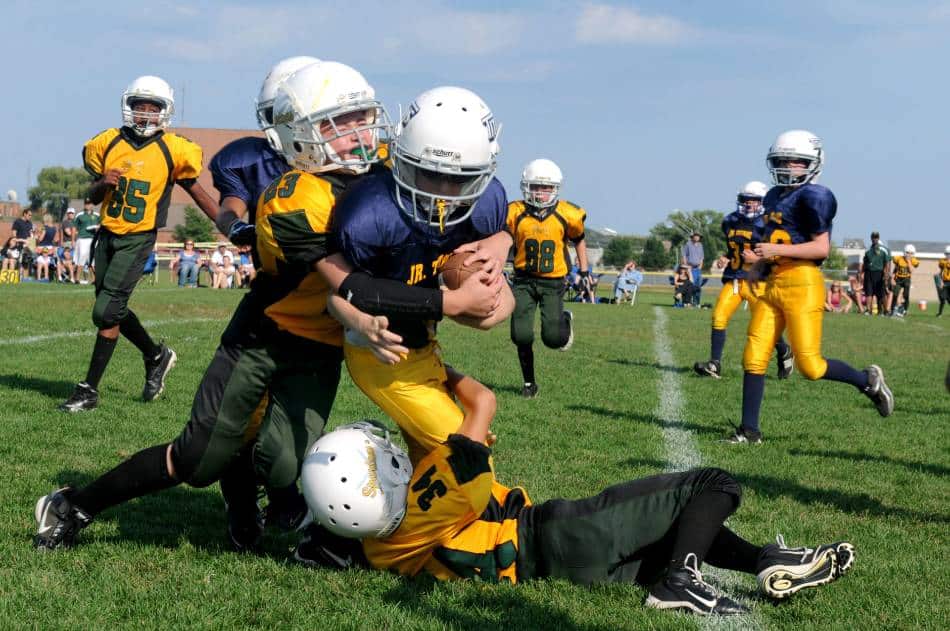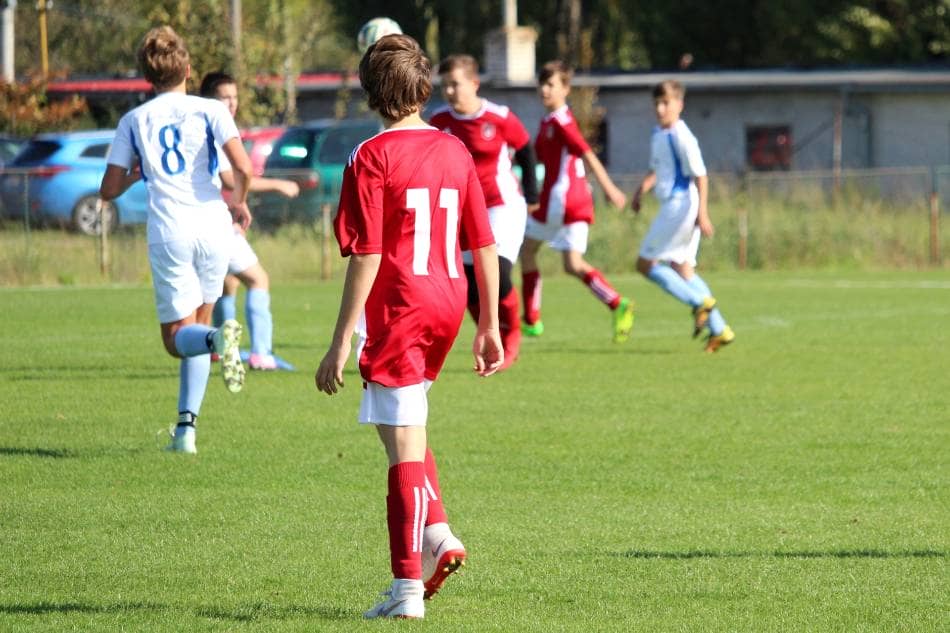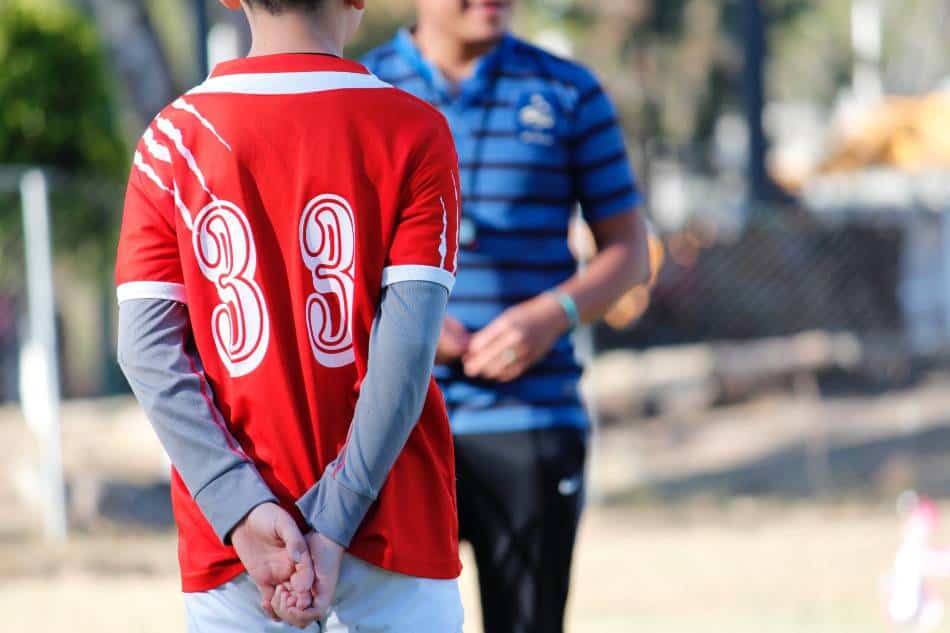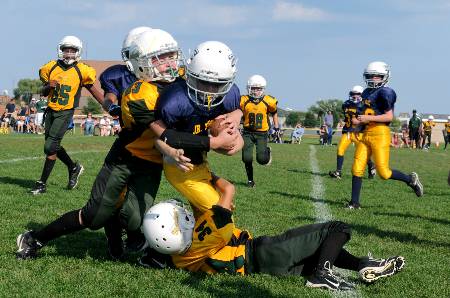
If you’ve coached some of the older age groups, chances are that you’ve encountered some disrespectful athletes. The attitudes that these athletes bring to the table are far from ideal, but with some work they can be improved upon or eliminated entirely.
So how do you coach disrespectful youth athletes?
The keys to coaching disrespectful youth athletes are: setting the standards, addressing their behaviors, keeping your cool, engaging them, getting to know them and offering plenty of positive encouragement.
Talking to an athlete regarding their disrespectful tendencies can be intimidating, there’s no doubt about that. It’s important you take some steps in fixing their behavior as it can snowball out of control if left unchecked. For more information on how to turn these attitude issues around, feel free to read on.
Set the Standards
Make sure you’re stern when setting the standards for your team. Create some guidelines and make sure you stick to them. Disrespectful players may push the boundaries as a form of acting out or simply to put the spotlight on themselves.
Be consistent with your standards and make sure your team knows that no player is above them. The worst thing you can do is give a player more leeway than others. This means you shouldn’t play favorites with your child or the star athlete on the team to stay in their good graces.
With that in mind, try not to set the standard too high. Your players are kids after all. Every kid is going to be a bit rambunctious in their own special ways. For this reason, you should offer kids some leeway. As the coach you shouldn’t try to completely dictate how your players act. Let them be themselves.
This only becomes an issue when players start to take advantage of you as the coach. Players who have tons of talents or those who aren’t as skilled may be more likely to press the limits. These players may feel like their talent, or lack thereof, gives them a pass to goof off and become a team clown. If you see this happening, say something sooner than later.
The talk can be as simple as letting them know that their behavior is unacceptable and that it affects the rest of the team. They are likely to care more about the actions if you’re able to show them that their actions are hurting the team as a whole. A lot of kids think they’re invincible, so it’s important to show them that they’re actions aren’t just affecting themselves.
It’s important that kids get their act together because their disrespectfulness probably isn’t going to be tolerated in high school and beyond. They need to realize that you’re doing them a huge service by working with them. High school athletes aren’t as likely to experience this luxury. Instead, they are like to ride the bench or get cut from the team.
Addressing the Behavioral Issues
Having a heart-to-heart with a disrespectful player is never easy, but overtime you’ll get a better idea of what to say. The best way to go about these talks is to pull the disrespectful player aside before addressing your concerns.
The purpose of pulling the player aside is so that you don’t put them on the spot in front of the rest of the team. You do this because your intentions are to address their behavior, rather than embarrass them in front of the team.
When you pull a player aside to talk to them, the gravity of the situation isn’t going to be lost on the rest of the team. The other players will understand what’s going on and will likely respect you more as their coach for trying to fix the issue(s) in private.
This also shows your team that the standards you put into place weren’t just for show. This will help you keep your coaching credibility and will help prevent your players from acting out in the future. It’s important to keep in mind that any player can become disrespectful if they’re given free reign.
Do your best to not let disrespectful players rub off on the rest of your team. If you don’t pull these players aside, the chances of the rest of your team adopting their attitude increases. It’s important that you be as proactive as you can, rather than reactive.
Keeping that in mind, you don’t need to punish players to get your point across. Punishing your players often doesn’t work and tends to be counterproductive. You should also be wary of punishing disrespectful players because you don’t want them get down on themselves and stop playing sports. If you’re coaching sports, you need to expect you’ll come across some attitude issues.
Keep Your Players Engaged

Many disrespectful athletes act the way they do because they want more attention. One way to address this phenomenon is to give them a larger role on the team. By giving them a bigger role, the hope is that we can show these athletes that they’re needed for the team to succeed.
Some of these larger roles are directly correlated to the positions they play on the field. Examples of these include: shortstop (captain of the infield), centerfield (captain of the outfield), playing goalie in hockey or soccer or playing a critical role in football such as running back or quarterback.
Most of these positions are great for disrespectful athletes because they place players in high-pressure situations. Players have to be on their A-game for these positions, which means they’ll be more focused on playing their best rather than being disruptive.
Along with the increased pressure, players are going to have more responsibility at these positions. This will help keep disrespectful players in line as they’ll feel more inclined to participate and contribute to the team.
The opposite can be said if you put players in positions that don’t see as much action. One position that immediately comes to mind is right field. Putting a disrespectful player in a spot like right field is likely to only fuel the fire. He’s going to feel like he’s not needed and there’s a good chance he’ll ramp up the attitude.
Placing a player in a position that sees less action also doesn’t fulfill our goal as a coach of improving their behavior. We want to see these players succeed on and off the field and putting them in a pseudo timeout is not the way to do it.
Keep Your Cool
Always stay calm when talking with disrespectful athletes. You should never let your emotions play a role in what you say to them. If you’re unable to keep your emotions in check, the likelihood of saying something you’ll regret later on increases.
If you say something in the heat of moment that doesn’t resonate with the player, you’re likely to make the situation even worse. The player in question may purposely become more disrespectful to get back at you or the opposite can happen, they could get down on themselves.
Not only will this affect how these players view you, it will also affect how the rest of the team views you. If you blow up and go off on a player, the team is going to take note and have a hard time viewing you as a credible source going forward. Always keep your emotions in check.
By keeping your emotions under control, players are also more likely to see you as a role model. Players who view you in this light will take what you have to say more to heart. There isn’t any secret to becoming a role model for a player. Just be there for them and offer them guidance as needed.
In addition to watching what you say, keeping your cool will also help players become more receptive to your coaching methods. They’ll realize that you have their best interests in mind and give you less of a hard time.
Most importantly, don’t hold any grudges with athletes. Treat each interaction with them as if it was the first time you spoke with them. If you let each interaction build upon each other, there’s a good chance you’ll boil over at some point. Don’t make any ultimatums or blow things out of proportion. Staying calm is your best bet when dealing with disrespectful athletes.
Get to Know Your Players

Always try to understand where an athlete is coming from. It’s important you go into every interaction with an open mind as everyone has a unique story. You never know what someone is going through until you take the time to ask. Until you do that, give the athlete the benefit of the doubt.
Think to yourself why they might be acting in a certain way. A great way to do this is putting yourself in their shoes. Once you look at it from their perspective, the picture may become clearer. You should also remind yourself that you had a lot going on at their age. Try not to fault them too much.
Let them tell you what’s troubling them and react accordingly. Maybe they broke up with a girlfriend/boyfriend, their parents could be on their case about something, school could be overwhelming them or there could be a host of other reasons. Talk to your players and find out where they’re coming from.
By hearing them out, you’re showing that you care about them as a person. The best coaches learn about their players away from the field regardless of them being disruptive or not. Doing this shows that you care about them on an individual level and that they’re not just there to help you win games.
With that said, find out their personal interests and ask about them. Maybe they love watching movies in their free time. They could also be really into something creative, like painting or drawing. They’re also most definitely into video games.
Take the time and ask them about their favorite movies and their favorite things to draw. Most importantly, give them a hard time about playing too many video games and make sure you tell them you could beat them at them anyways. If you really want your players to respect you as a coach, you need to respect your players for who they are.
By becoming more acquainted with your players, they’ll start to see you as a more credible individual and really start to buy into what you have to say. There are no negatives associated with getting to know your players. It allows us to better connect with our players and without a doubt will lead the team to more victories.
Once they let you in on what’s going on, don’t be afraid to offer accommodations as needed. Show them that you want what’s best for them. Tell them that winning is fun but their well-being is more important.
So don’t be afraid to ask them how their day was or how that math test went. Players will appreciate you taking the time to talk with them on a personal level. A great opportunity to talk with players is before or after practice. Be understanding of their situations and offer any support that they may need.
Another great way to get to get to know your players is to schedule team activities. This could be just about anything: a pool party at a player’s house, going to the movies, picnic at the park, group outing to a professional sporting event and the list goes on. Think outside the box! These events will serve as opportunities to bond with each other and will be a ton of fun.
And when you’re at these events, don’t be afraid to engage with the parents. The benefits of being on good terms with the parents is seemingly endless. They may help you set up the field before the games or help you clean up the field after the games, they could help you out during practices and games or they could keep score during games. There are so many benefits to getting to know the parents and showing them that you have their child’s best interest at heart.
Positive Reinforcement: Pass It On
Positive reinforcement goes a long way. You’d be hard-pressed to find someone who doesn’t respond well to words of encouragement. Keep this in mind next time you’re working with a player that’s a handful.
We always want to point out the positives instead of the negatives when talking with athletes. We do this because positive reinforcement is more likely to have the desired effect than negative reinforcement. You’re playing with fire by ripping into players.
There’s some players out there who will push themselves when they get yelled at, but they’re few and far between. By praising players when they do things well, you’ll be able to help them build confidence in themselves and show them that they’re a valued member of the team.
Once players learn that their contributions matter and that their team depends on them, they’ll be more inclined to try their best for every game. A great way to build a player’s confidence is by highlighting what they do well. If a player is great at running routes and getting open in football – let him know!
He’ll appreciate what you have to say and he’ll know that he’s on the right track going forward. Having an overall positive vibe as a coach also goes a long way. Make sure to smile, joke around with your players and show that you’re a real person.
